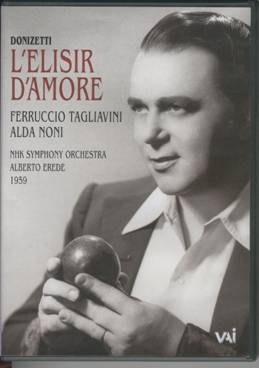DVD VAI 4492

Elisir d’amore w. Tagliavini and Noni
DVD VAI 4492

This is probably not a DVD one buys for the inspired acting of the singers and nevertheless this is what one gets: seasoned professionals who know what to do on a scene, who enjoy themselves and their audience, who act totally believable. The performance is an utter denial of the pontificating by some managers like the Flemish peacock Mortier that opera performances used to be concerts in costume. Even a so-called typical Italian tenor like Ferruccio Tagliavini shows no awkwardness at all but proves how well a sympathetic country-bumpkin he can play (he is the only one to step out of character after “una furtiva lagrima”). Still, this is not a DVD for eternity. The picture quality is not optimal, understandable for the time but the moment the camera starts panning instead of focussing on close-ups graininess takes over. Moreover, Dulcamara’s big entrance scene has been lost and the highlight of Paolo Montarsolo’s performance is illustrated with photographs. And the two title singers are not young anymore: Tagliavini was 44 and Alda Noni one year younger and the black and white pictures make them seem even somewhat older; notwithstanding their vigorous acting. Most collectors will probably not give a damn as they want only to watch some legendary names in a real live performance. But here too the DVD slightly disillusions. The big star is the tenor but by 1959 Tagliavini had forced his once incredibly beautiful sound by singing heavyweights like Cavaradossi, Riccardo etc. He himself complained that a lot of people clearly only wanted him to sing Fritz Kobus while he had more to offer. I honestly doubt that though I think that his honeyed timbre and the most beautiful pianissimi ever sung by a tenor would always have suffered by singing opera: probably only light songs could have kept up this vocal miracle for more than ten years. During this performance the sound is still easily recognizable Tagliavini’s but it has coarsed everywhere. He doesn’t resort much anymore to his fabled pianissimo and when he does, like in “una furtiva lagrima”, the decline is markedly too. Strangely enough for a tenor who was at his best in lirico-leggiero roles, he always had difficulties when he had to sing florid music ( as is clearly noticeable in the DVD of the 1945 Barbiere too) as his voice was too unwieldy. One still hears that this was a major voice but also one definitely in the past. Alda Noni’s voice has better withstood the usury of time and she still sings a technically perfect Adina; fine coloratura, spontaneity in the delivery and lots of charm. But even with Noni one hears that the vocal colours have become somewhat faded and that the voice has lost the freshness of youth. Arturo La Porta never had a world career; indeed he often sang smaller comprimario roles at the major Italian theatres. But his nice warm baritone voice is almost ideal for the role of sergeant Belcore. Paolo Montarsolo was not in his best voice during the evening: the sound is gruff and not memorable and there are better examples on record of his art. Alberto Erede is the capable conductor at the head of his Japanese orchestra and one has to admire the Japanese chorus for its involved singing and acting in what after all is a piece quite different from their own traditions, especially 50 years ago. So this is a DVD for the fans only. If one really wants legendary singers in a well sung performance (and well acted too) there is the magnificent black and white 1968 Elisir with Bergonzi, Scotto and Taddei.
Jan Neckers